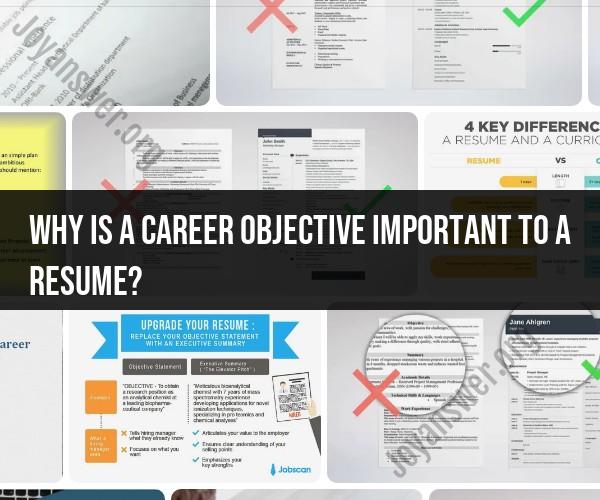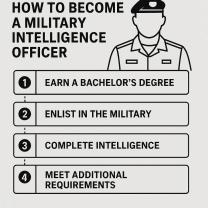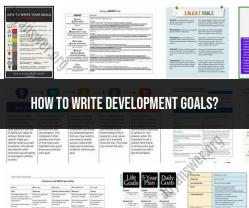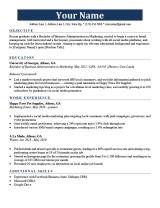Why is a career objective important to a resume?
A career objective, sometimes referred to as a resume objective or professional summary, is a brief statement typically found at the beginning of a resume. While it was once a common inclusion in resumes, its importance has evolved over time, and its inclusion is now a matter of personal preference and context. Here are some reasons why a career objective can be important to a resume:
Clarity and Focus: A well-written career objective can provide clarity to employers about your career goals and intentions. It tells them what type of role you're seeking and what you aim to achieve in your career.
Customization: A career objective can be tailored to match the specific job or industry you're applying for. It allows you to demonstrate your alignment with the position and the company's goals.
First Impression: Your resume's opening section is one of the first things employers read. A compelling career objective can make a positive first impression and grab the reader's attention, encouraging them to read further.
Highlighting Relevant Skills: You can use the career objective to highlight your most relevant skills and qualifications for the job. This can help the employer quickly identify your suitability for the position.
Career Transition: If you're making a career change or have a diverse background, a career objective can explain your motivations and bridge the gap between your past experiences and your desired role.
Resume Tailoring: A career objective can serve as a guide when tailoring your resume for different job applications. It helps you focus on relevant information and omit details that aren't pertinent to the role.
Networking and Online Profiles: In some cases, a career objective can be useful when creating online profiles or LinkedIn summaries. It can help others understand your professional aspirations.
However, it's important to note that the use of career objectives on resumes has become less common in recent years. Some hiring managers and recruiters prefer to see a resume that starts with a professional summary or a skills section that highlights key qualifications and achievements upfront. This format provides a concise snapshot of your qualifications without the traditional "objective" statement.
Ultimately, whether or not to include a career objective on your resume depends on your personal preferences, the industry norms, and the specific job you're applying for. If you choose to include one, make sure it is well-crafted, concise, and tailored to the position you're seeking. If you decide not to include a career objective, ensure that your resume effectively communicates your qualifications and career goals in other sections, such as your professional summary or cover letter.
The Significance of a Career Objective on Your Resume
A career objective is a brief statement on your resume that summarizes your skills, experience, and career goals. It is an opportunity to tell potential employers what you are looking for in a job and what you can offer their company.
A well-written career objective can make a strong impression on potential employers and help you to stand out from the competition. It can also help you to get noticed by recruiters and hiring managers who are using applicant tracking systems (ATS) to screen resumes.
Crafting an Impactful Career Objective for Your Resume
When crafting your career objective, keep the following tips in mind:
- Be specific. State your desired job title and the industry in which you want to work.
- Highlight your skills and experience. Mention the skills and experience that are most relevant to the job you are applying for.
- Be clear about your goals. State what you hope to achieve in your career and how the job you are applying for can help you to achieve those goals.
- Be concise. Keep your career objective to two or three sentences.
- Proofread carefully. Make sure there are no errors in grammar or spelling in your career objective.
Here is an example of an impactful career objective:
Software Engineer with 5+ years of experience in developing and maintaining web applications. Seeking a challenging position in a fast-paced environment where I can use my skills to develop innovative and user-friendly products.
This career objective is specific, highlights the candidate's skills and experience, and is clear about their goals. It is also concise and well-written.
Elevating Your Resume with a Well-Crafted Career Objective
A well-crafted career objective can elevate your resume and make you a more attractive candidate to potential employers. By taking the time to write a strong career objective, you can increase your chances of getting noticed and landing the job you want.
Here are some additional tips for elevating your resume with a well-crafted career objective:
- Tailor your career objective to each job you apply for. Highlight the skills and experience that are most relevant to the specific job you are applying for.
- Use keywords throughout your career objective. This will help your resume to get noticed by applicant tracking systems (ATS).
- Be honest and realistic. Don't exaggerate your skills or experience in your career objective.
- Have your career objective reviewed by a friend, family member, or career counselor. This can help you to identify any areas that need improvement.
By following these tips, you can write a well-crafted career objective that will elevate your resume and help you to land the job you want.












